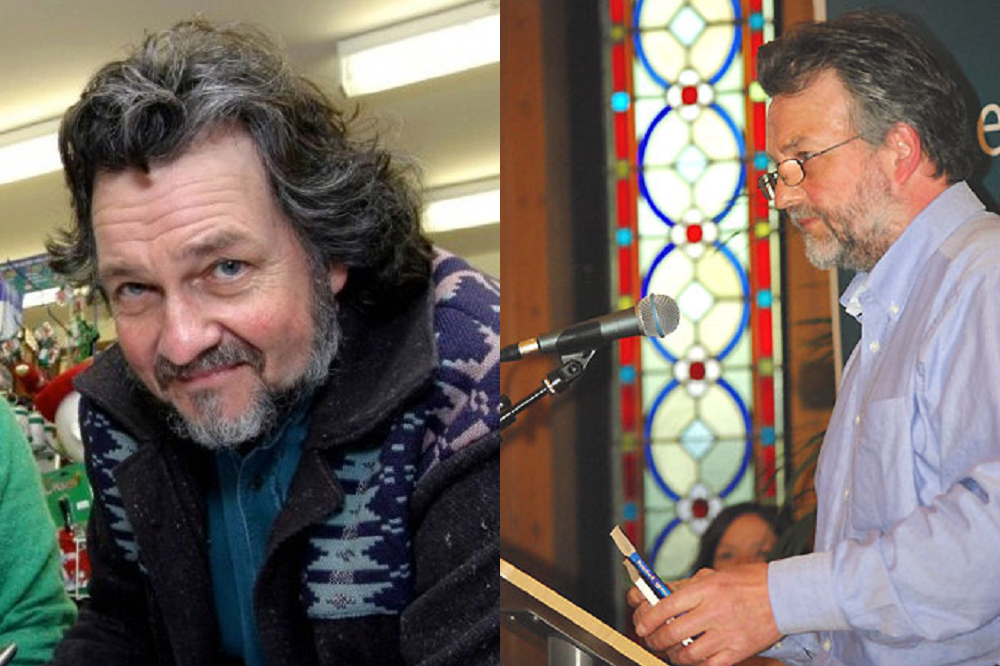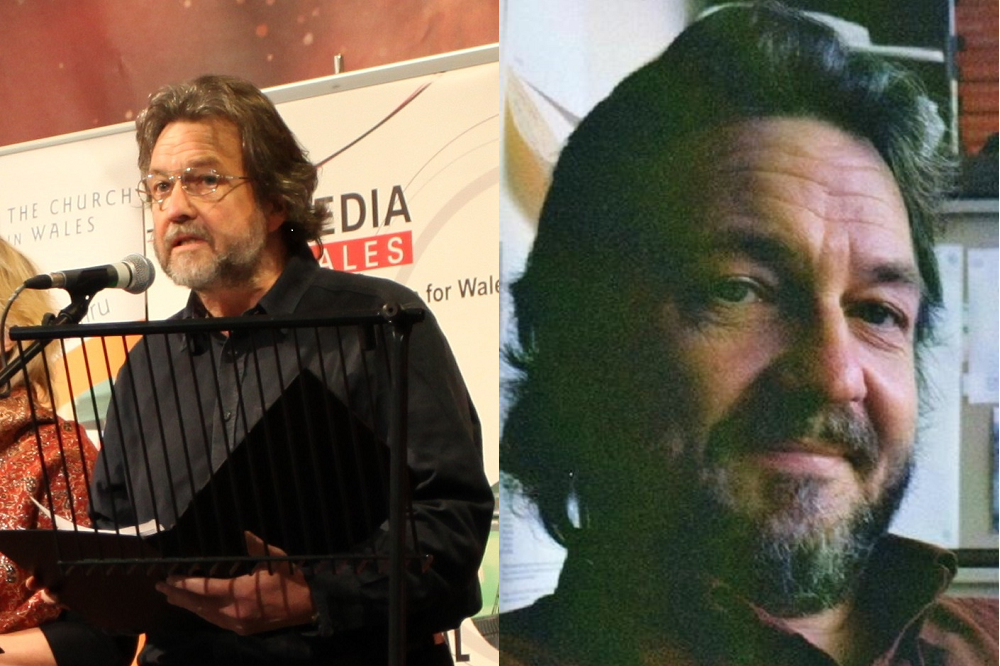Review: Damned for Dreaming by Nigel Jenkins

Ant Heald, winner of the Inaugural Nigel Jenkins Literary Award, reviews a new collection of essays.
I recall sitting on a bus crying silently when I heard of the death of a hero of my youth, John Peel, in 2004, but until recently I don’t think I had ever felt the same emotion about someone I only encountered several years after their departure from this life. Yet such has been the impact of a newly compiled book of essays by Nigel Jenkins, who died in 2014 aged 64: that early autumnal stage of life when, far from being felled, we feel that life is set to yield its ripest fruit.
So, it seemed fitting that one of the most affecting pieces in ‘Damned for Dreaming’, was a previously unpublished homage to his father, originally broadcast on John Peel’s Home Truths Radio 4 show in October 2000. Jenkins speaks of overtaking the age, 48, that his own father died: “If my luck holds for ten or twenty years more, I could be the grey and balding paterfamilias that my youthful old man never made it to be.”
Well, he made it part of the way, but sadly pancreatic cancer got luckier before he could, as he apostrophised to his late dad, grow “old for the pair of us.” This piece is made all the more poignant by being placed immediately after Nigel’s personal tribute to his mother, delivered to family and friends at her 80th birthday party: “Just about anyone, by definition, can do common sense. Much more productive is the kind of thoughtful uncommon sense you have been able to reach for at difficult times”.
Uncommon sense
Nigel clearly inherited and cultivated that ‘uncommon sense’ which is displayed across the varied categories of writing arranged in a loose structure from journalistic articles addressing Welsh public affairs that open the book, leading into the most substantial part of the collection, exploring Jenkins’ literary and cultural interests, blending criticism, biography and memoir.
These pieces are always firmly rooted in a republican vision of Wales, but fertilised by a generously internationalist perspective, epitomised by the titular essay Damned for Dreaming, a portrait of Swansea based Algerian exile-poet Soleïman Adel Guémar, and the essay on the founding of the H’mm Foundation, publisher of this collection, by Jenkins’ friend, the Iraqi refugee, entrepreneur, and philanthropist, Ali Anwar.
The more ‘time-bound’ and parochial aspects of the opening essays at times compound the sense of loss at a life curtailed, with their reference to things now lost. One of several pieces from the Welsh Internationalist journal, Planet, explores the emerging Swansea dockland development. Jenkins was no enemy of progress and looks forward “to drinking an espresso on the waterfront terraces of SA1”, but in lamenting the history of what was often thoughtlessly swept away to make this possible (there are frequent biting asides in the book at unimaginative and philistine authorities), there is a casual reference to “where, most days, the Swansea – Cork superferry docks.”
This reminds us, since that ship last sailed even before his own final passage, that Nigel has become part of the history he was writing about. This is not the only place where the detail is inevitably dated, such as his hope that “by the time of their independence referendum in 2014 the Scots could summon the gumption to vote Yes.”
Disappointed as he would have been to see that hope dashed, he would surely have been heartened to find his assertion a few lines later that in Wales “fewer than 10 per cent of the population … favour independence” is now an underestimate by a factor of three. Elsewhere, there is real prescience and insight, as in the essay on the Gower agricultural crisis.

Gentrification
Jenkins grew up on a Gower farm and laments the gentrification of a beloved landscape, as surely as he catalogues the social and psychological significance of its increasingly forgotten field names, Cocklebushes, Priest Hay, Deer Park, Tower Field: “Where once there was a single farmhouse in the midst of a working farm, there may now be a rash of ‘farmhouses’ — of boxy or grandiloquently pretentious design, with rootless names, pseudo-Victorian lampposts and defensive electric gates — dotting the pathetically redundant fields.”
The sense is sadly still all too uncommon to recognise that this influx of money extracts true value from the land, which needs — if we are to turn from the madness of meat “shipped halfway round the world and sold to us over-fed dupes at knockdown prices” — to return to “social ownership … for the production, once again, of the staple of life”.
Jenkins also espoused ‘social ownership’ of literature, arts and culture. An underlying theme, especially in his portraits of fellow writers and artists that form the heart of the book, is the importance of suffusing Anglophone Welsh culture with the democratic nature that, as a late returner to his ancestral tongue, he clearly saw still thriving in the Welsh language community.
For me, his most powerful and important message, is that quality and authenticity transcend trends, and his choice of subjects to champion and his manner of writing about them act as a manifesto for exploding the distinction between popular and ‘serious’ art that serves the professional interests of publicly subsidised cultural gatekeepers rather than the people they are supposed to serve.
Portrait
When writing about avant-garde concrete poet, Childe Roland, Jenkins acknowledges that concrete poetry “admittedly, isn’t everyone’s bag of cement” but emphasises that this was a poet who performed “in a barn, at farm, on the side of a mountain” and “was met with raucous cheers and demands for an encore… This was not an audience of the literary establishment; this was a party attended by over a hundred people.”
That portrait of Childe Roland follows one of the poet Idris Davies, which acknowledges the unfashionability even in his own time of his use of archaic diction and traditional rhyme and metre but goes on to argue that “in rejecting a modernist approach, he opted instead for what it is possible to recognise today as postmodernist techniques.”
Jenkins strenuously argues against the orthodoxy that a poet needs to “find a voice” and “having got it, superglue that priceless commodity to his or her bardic being.” A similar suspicion of narrow vision suffuses his appreciation of painter Evan Walters (The Man Who Saw Everything Twice) who offers an artistic analogue in some respects to Jenkins — not wedded to a particular style (or voice) but appreciating & using whatever tools are most useful for the task at hand.
Jenkins brings together poets and artists who might seem like polar opposites — the populist and the avant-garde — in an embrace that emphasises the importance of bridge building and generosity in appreciating work on its own terms. His warmth is, however, never fuzzy, and he could be coruscating in condemning the insincere and second-rate.
A memorable phrase in his deeply personal memoir of poet English poet Adrian Mitchell’s Welsh connections avers that he avoided “the fashionable clever-dickery that seems to be the raison d’être of too much contemporary verse”, and in introducing the winners of a poetry prize that he co-judged, Jenkins laments that “it’s surprising how many would-be poets lack an ear for rhythm — it’s as if a singer were tone-deaf.” But if he is at times a master of invective, he is never vindictive.
This truth is amplified in the book’s lengthy coda of tributes and obituaries that testify to a life lived as generously in his personal and professional relationships as his essays show Nigel Jenkins to have been in his literary and journalistic work.
At the book’s launch, Nigel’s daughter, folk musician Angharad Jenkins, performed in front a projected backdrop of photographs of her father’s Mumbles flat, as he had left it before his final illness. Still hanging in his room was the embroidered donkey jacket he wears on the book’s cover, and which Peter Finch’s tribute claims he must have worn “for forty years”.
An embroidered donkey jacket seems a fitting metaphor for this collection of essays: workmanlike and commonplace though many of them are as pieces commissioned for particular times and events, they are nevertheless woven throughout with the timeless and versatile artistry that made Nigel Jenkins a giant of the Welsh cultural scene.
To purchase a copy of the book contact : [email protected].
Support our Nation today
For the price of a cup of coffee a month you can help us create an independent, not-for-profit, national news service for the people of Wales, by the people of Wales.






